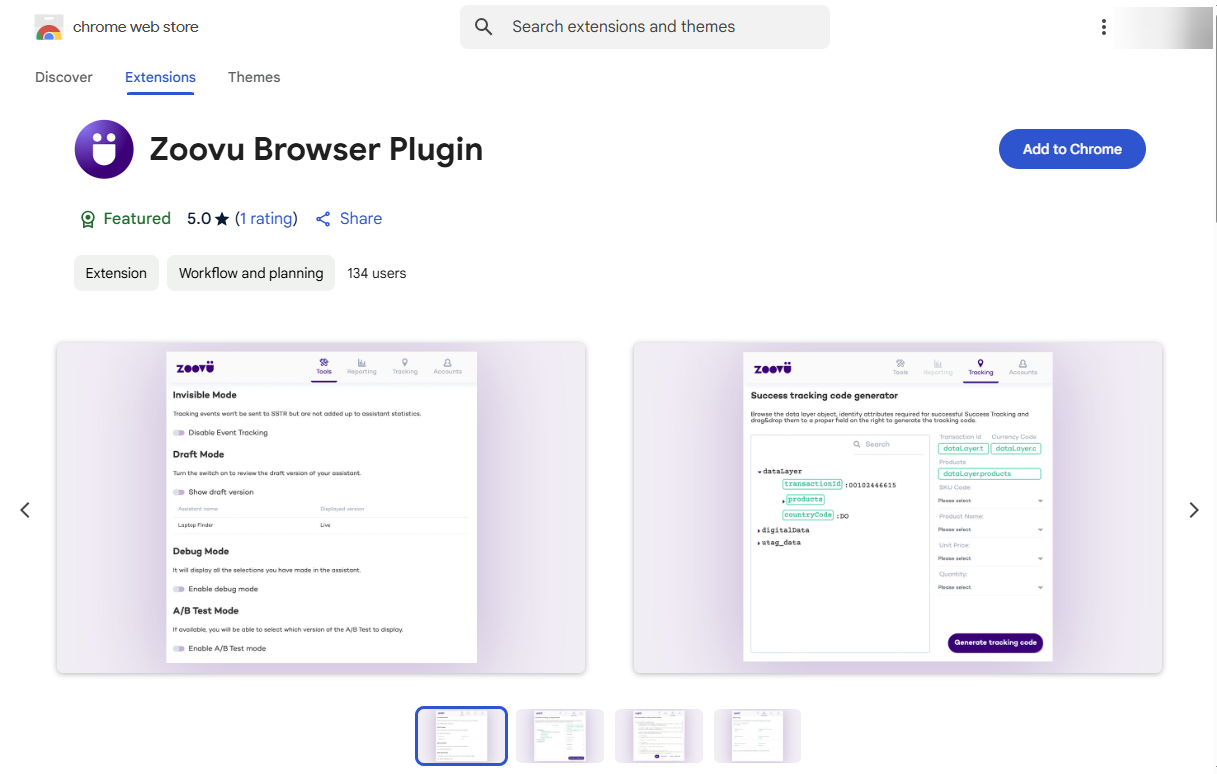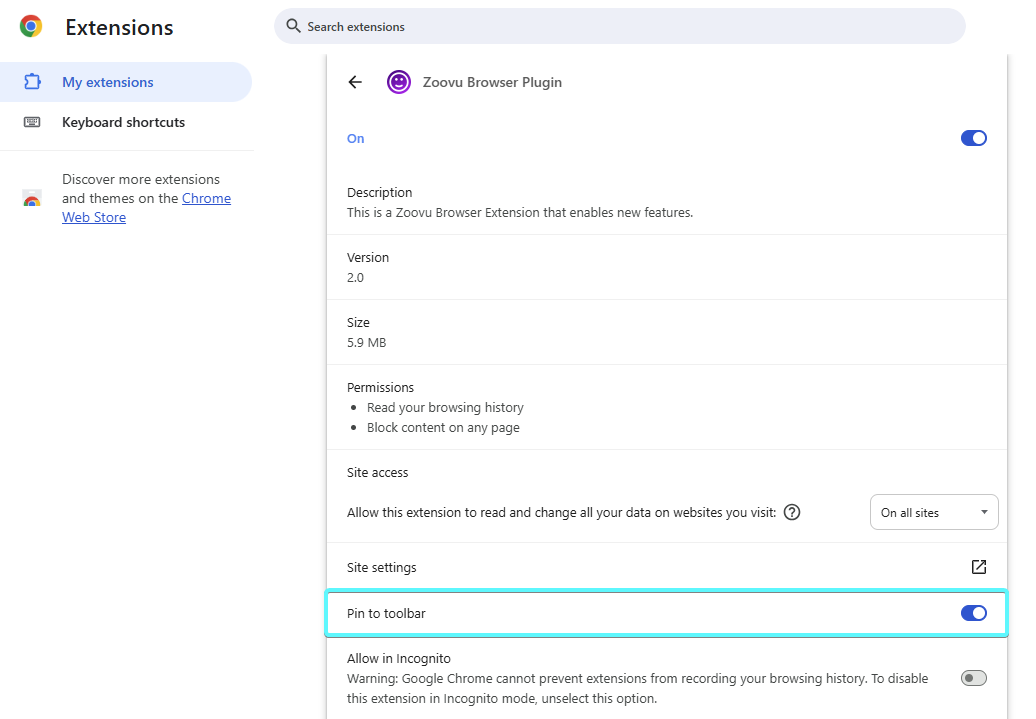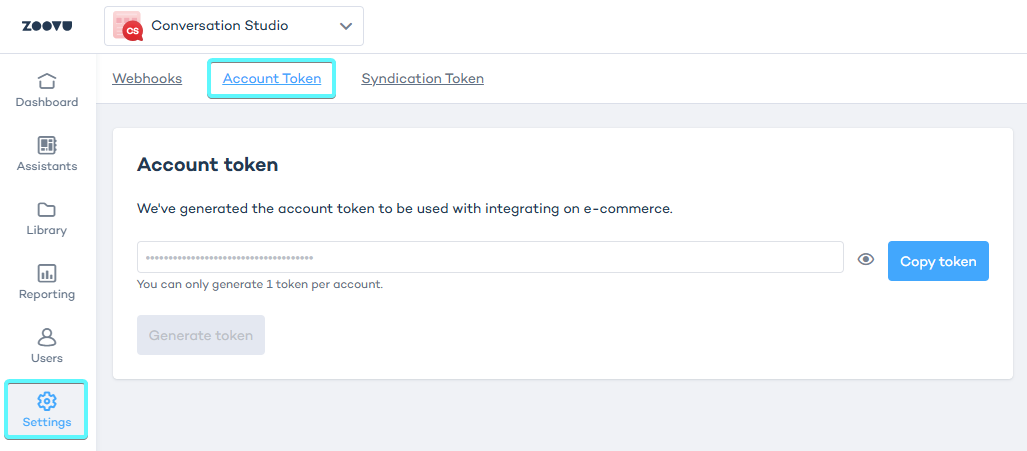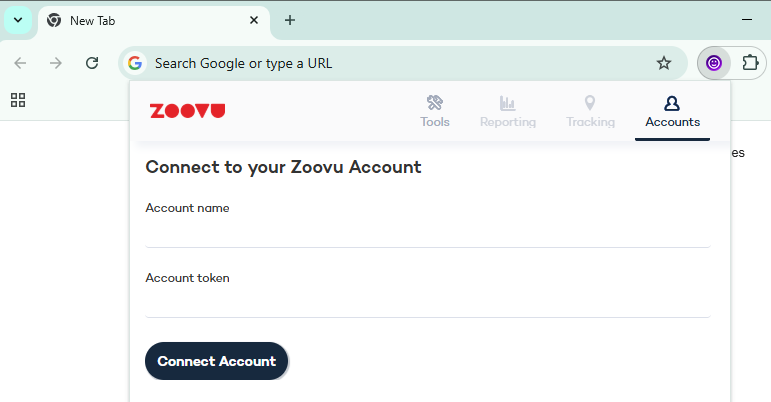Zoovu Browser Plugin
With the Zoovu Browser Plugin, you can test, debug, and improve your assistants directly on the webpages they are integrated into. Use this tool to:
- Check integration and account connections
- Test assistants without affecting analytics
- Run A/B tests and debug recommendation logic
- Generate and test tracking scripts
Step 1: Install the extension
To get started, install the Zoovu browser extension from the Chrome Web Store:
- Go to the Chrome Web Store and open the extension page.
- Click "Add to Chrome".
- Confirm the installation.

- You can pin the extension to your Chrome toolbar for quick access (optional but recommended). Go to
chrome://extensions/, click "Details" on the Zoovu Browser Plugin, and switch on the "Pin to toolbar" toggle:

Pinning the plugin to the toolbar will create an icon next to the search bar in Google Chrome.
Step 2: Set up your account
Before using the extension, connect your Zoovu account.
- Log in to your Zoovu account.
- Go to Conversation Studio > Settings > Account token.
- If a token is already available, click Copy token.
- If the field is empty, click Generate token, then copy it.

Step 3: Connect your account
- Open the Zoovu extension.
- Go to the Accounts section.
- Enter an account name (any name you choose).
- Paste the token you copied from your Zoovu account.
- Click "Connect Account".

Your account name will appear below the button if the connection is successful. You can repeat these steps to connect multiple accounts.
Using the Zoovu Browser Plugin
To start using the extension, open the webpage where your assistant is integrated and launch the extension. It will automatically check:
- Whether your Zoovu account is connected.
- Whether the assistant’s integration code is working properly.
If the account check fails, ensure that the assistant belongs to a connected account. If the integration check fails, review the implementation of your assistant’s code on the website.
The extension supports multiple accounts and will automatically detect if the assistant belongs to one of them.
Tools for testing and debugging
The Zoovu Browser Plugin includes various tools to help you test your assistant without impacting real customers' data.
Invisible mode
When enabled, any interactions you perform in the assistant will not be logged in analytics. Useful for testing scenarios without affecting reports or AI-driven insights.
Draft mode
View and test the latest draft version of your assistant before publishing. If a new version has been published, you’ll be notified.
Debug mode
Opens a separate window showing all user selections and how the recommendation logic works. Helps detect and fix logic errors in the assistant.
A/B test mode
If the assistant is part of an A/B test, this mode allows you to:
- Select a specific assistant version from the test.
- Click Set Version to preview and analyze that version.
Reporting
The extension allows you to switch between live reports for:
- The latest published version of an assistant.
- The draft version (if you are testing changes).
- A specific version in an A/B test.
Simply select the version you want to analyze.
Tracking success
The Zoovu Chrome extension helps set up success tracking on the Thank You page to monitor how users interact with your assistant.
Generate tracking code
- Open the Thank You page in your Chrome browser.
- Launch the Zoovu extension and go to the Tracking section.
- Expand the dataLayer section.
- Drag and drop elements for:
- Transaction ID
- Currency code
- Products array
- Select values for these fields from the dropdown menu.
- Click Generate tracking code. The tracking script will be generated.
Test tracking code
Run a test before implementing the code. If errors appear, they will be highlighted in red.
- You can edit the code directly in the extension.
- Run the test again to confirm that the script is error-free.
- Once everything looks good, download or copy the tracking code.
- Add the code to your Thank You page.